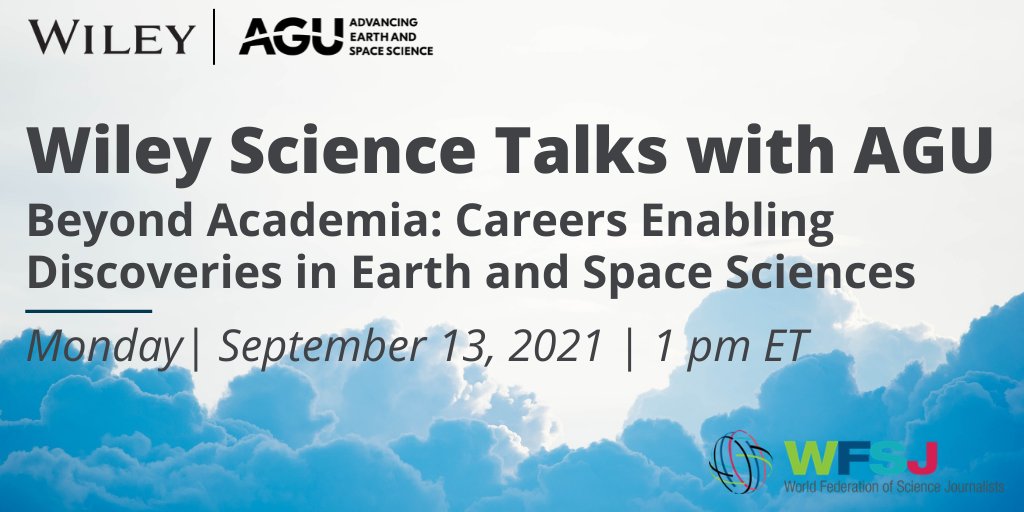
The challenges posed by our rapidly changing planet are numerous, but the good news is that they are underpinned by science. With a deepening climate emergency, we need scientists who can focus on new, creative pathways to solving our planet’s pressing issues. Rather than the traditional road to academia, more and more Earth and environmental scientists are developing their own careers—they join tech shops, launch entrepreneurial ventures, inform policy, and more. Register today for this complimentary webinar, hosted by Wiley and AGU, featuring a panel discussion with Earth scientists who have embraced new ways to participate in today’s solution making. Media who attend this webinar will: Explore how career paths in Earth, environmental and climate sciences are key to solve some of the world’s greatest challenges Discover what high-impact career paths are available to those with Earth and environmental sciences degrees Hear expert insight from Earth science leaders on the future of our planet and how they see science contributing to a better future Find out about current research, established programs and resources in this field.
REGISTRATION INFORMATION
Journalists may register for this complimentary Science Talks webinar.
If you are not able to attend the live one-hour session, the webinar will be recorded for later viewing.
About the Program Wiley Science Talks provides ongoing education for journalists through free webinars on topics of global importance. Held in partnership with the World Federation of Science Journalists (WFSJ), each session connects journalists with research experts who explain complex science topics. Science Talks are recorded and includes access to relevant research and trusted resources to support evidence-based journalism.
About the Speakers
Aisha Morris is a Program Director for Education and Human Resources at the National Science Foundation. At NSF, Aisha is working to bring previously excluded groups into the geosciences through programs like the Improving Undergraduate STEM Education (IUSE) initiative. IUSE funds projects for precollege, undergraduate, and graduate students with a focus on service learning and outreach to historically excluded groups and from non-geoscience degree programs.
Cooper Elsworth is a Product Manager at the sustainability start-up Descartes Labs, where he leads the production of sustainability tools that use remote sensing to track things like carbon emissions from agricultural and consumer goods supply chains.
Karen Layou is a Professor of Geology at Reynolds Community College. She is involved in Supporting and Advancing Geoscience Education at Two-Year Colleges. The project aims to broaden participation in the geosciences, clarify transfer and workforce pathways for students at 2-year colleges, and emphasize best teaching practices for faculty.
Rick Jones is a Geoscience Educator at the University of Hawai‘i–West O‘ahu. He is also President of the National Earth Science Teachers Association, where he aims to instill a love of learning in the next generation of science teachers. Moderator:
Susan Lozier is AGU President and is Dean of the College of Sciences at Georgia Tech. She is currently the international project lead for Overturning in the Subpolar North Atlantic (OSNAP), an observing system designed to measure the meridional overturning in the subpolar North Atlantic. Her research focuses on understanding the physical controls on marine productivity. Wiley Presenter:
Gemma Cassidy is Senior Journals Publishing Manager at Wiley responsible for a portfolio of Earth and Environmental Sciences journals. Her PhD focused on the geophysical investigation of the Makran subduction zone.
About AGU
AGU (www.agu.org) supports 130,000 enthusiasts to experts worldwide in Earth and space sciences. Through broad and inclusive partnerships, AGU aims to advance discovery and solution science that accelerate knowledge and create solutions that are ethical, unbiased and respectful of communities and their values. Our programs include serving as a scholarly publisher, convening virtual and in-person events and providing career support. We live our values in everything we do, such as our net zero energy renovated building in Washington, D.C. and our Ethics and Equity Center, which fosters a diverse and inclusive geoscience community to ensure responsible conduct.
About Wiley
Wiley is a global leader in research and education, unlocking human potential by enabling discovery, powering education, and shaping workforces. For over 200 years, Wiley has fueled the world’s knowledge ecosystem. Today, our high-impact content, platforms, and services help researchers, learners, institutions, and corporations achieve their goals in an ever-changing world. Visit us at Wiley.com, like us on Facebook and follow us on Twitter and LinkedIn.